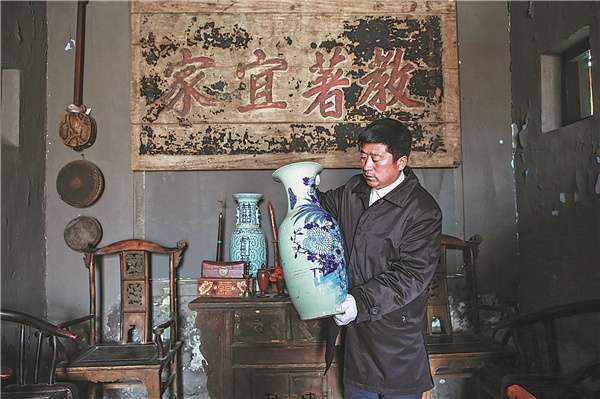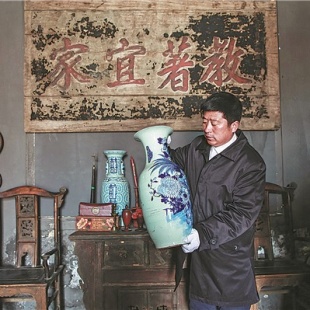A place of artifacts, and ideas


The callused hands of Huang Yanhui look more like those of a farmer than a museum curator's. Yet he has been the "curator" of the Northern Folk Museum of Heilongjiang in Bayan county, Northeast China's Heilongjiang province, since his father Huang Xinzhang founded it in 2013.
Huang Xinzhang was an educator of sorts all his life and had just one wish: to establish a folk museum. He started his career as a painter, often painting and drawing images on boxes and cabinets of villagers free of charge. As a result, many villagers sent him old, useless cabinets to paint and he made them look new and attractive.
Perhaps it was then, as Huang Yanhui said, that his father became fascinated with old objects and began collecting them, especially those related to ethnic minorities. For more than 40 years, Huang Sr.collected many precious ethnic minorities-related objects. Huang Yanhui recalled that sometimes his father used to be away from home for up to half a month, visiting one place maybe dozens of times looking for specific objects.
Huang Xinzhang had two special treasures, two military jugs-one for alcohol to keep the body warm, the other for water to keep the body cool. To save money, he stayed overnight in the waiting room of railway stations when traveling to collect old objects. Huang Jr. recalled that once, to save the freight for a large wooden wheel, his father dismantled the wheel and carried it bit by bit from the mountains.
"I have to pursue something," his father often told Huang Jr. "That's my hobby. I want people to know how their ancestors lived and how they got where they are today."
Huang Xinzhang used to say he would retire after building a museum. And in 2013, he stopped working after founding the museum, and died two days later at the age of 71.
Since building a museum was Huang Xinzhang's lifelong dream, the entire family devoted itself to completing the construction of the folk museum after his death. Tao Shuzhi, a retired rural teacher and wife of Huang Sr., became the legal representative of the museum while his three sons, Huang Song, Huang Yanfei and Huang Yanhui spent almost half of their earnings and made concerted efforts to complete and operate the museum.
The museum, open to visitors free of charge, has become what Huang Xinzhang said would be a "public school" belonging to not only Bayan county but the province and the nation. The authorities have now recognized it as a local patriotism education base.
With an exhibition area of 5,100 square meters and more than 40,000 exhibits, the museum showcases folk culture and the life of all ethnic groups north of the Yellow River, particularly the 10 ethnic minorities in Heilongjiang province-the Manchu, Korean, Mongolian ethnic group, and the Hui, Daur, Xibe, Oroqen, Hezhe, Ewenki and Kirgiz people.
Huang Yanhui said that the story of almost every exhibit is associated with his father. For instance, a few people were seriously injured while trying to stop a 3-ton stone mill he tried to roll back home from veering off the course.
So far, the Huang family and their relatives have invested more than 3 million yuan ($465,300) in the museum, and people from home and abroad have paid a total of 1.02 million visits to it, among which about 30 percent were primary and middle school students. And many of the visitors have said that what the Huang family has done is laudable, and donated money to promote their cause.
Ma Dong, a professor of English literature and linguistics at Qiqihar University, who visited the museum in January with a group of college students from Beijing and Harbin, said the visit was an "eyeopening experience", because before visiting the museum even she, a native of Heilongjiang, didn't know so much about the splendid ethnic cultures and history of the province. More importantly, she, along with many other visitors, were "touched" by the Huang family's commitment to the cause.
"To be precise, Huang Xinzhang's commitment is a reflection of his attachment to the land," Ma said. "As the best educated man with a strong sense of justice in the village, Huang showed us what a big difference one devoted and knowledgeable person can make to his family, as well as his hometown. It is his respect for culture and sense of responsibility of helping others learn from the past that have endowed an otherwise mundane hamlet with a unique spiritual legacy, which can be passed down to future generations," Ma added.
Motivated by the development of the museum, some archaeologists and historians in Heilongjiang have volunteered to serve as counselors. "Their professionalism is indispensable to the success of the museum," Huang Yanhui said, adding that funding is a problem, and to solve it, and perhaps even earn some money, the museum is seeking the cooperation of partners and sticking to its free visit policy.
Li Peiyong, a former publicity official of the Bayan county government, claimed the museum is becoming a top cultural attraction in the county, and said he hoped it would acquire more vitality by further integrating into the county's cultural industry.







































